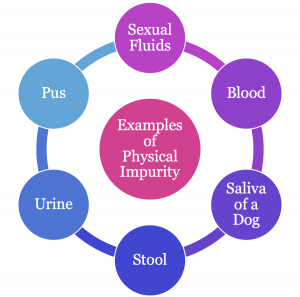How Can We Help?
Removing Impurity
The Beloved Messenger (may Allah bless him and give him peace) said, “Cleanliness is half of faith” (Sahih Muslim 203/1). Being free of impurities is a precondition to worship, so a Muslim must know the proper method of cleaning the body and clothing.

The Fiqh of It
How to Remove Physical Impurities
- If any impurity is on the body, wash the area until the impurity is removed.
- If any impurity is on the clothing and it is visible, wash the clothing until the impurity is removed. If the garment is washed several times, but a stain remains, the clothing will be considered pure.
- If the impurity is not visible (e.g. urine), wash the clothing 3 times, wringing the garment each time. Using a washing machine fulfils this requirement.
Validity of Ritual Prayer (Salat)
- If the impurity on the body/clothes is smaller than the concave of one’s palm:
- Salat will be valid, but disliked (makruh).
- This ruling does not give leeway for people to become neglectful regarding smaller amounts of filth. Rather, one should try to pray in a perfect state – free from any physical impurities.
- If the impurity on the body/clothes is the same size or larger than the concave of one’s palm:
- Salat will be invalid.
- For an excused person:
- It is obligatory for the body/clothes to be free from impurity for salat. However, if it is likely the impurity will return before wudu and salat are complete, cleaning is not necessary, and the excused person can pray in that state.

